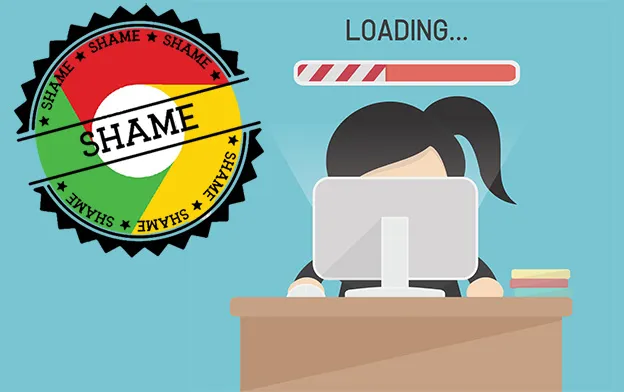
Googles’ plans to label websites based on load-speed performances and what it might mean for your website.
A few weeks ago, the tech giant, Google, announced at the Chrome Dev Summit in San Francisco their intention to introduce a ‘Badge of Shame’ for slow loading website. This would give users an immediate message that the website is slow to load. Similarly, they would like to reward faster loading sites with a ‘green badge’ or a badge of honour. Effectively, they will be putting certain websites in the bold corner, and others up on a pedestal. The worry for those who identified as slow, is how users will react to the branding. Currently, the Chrome team are choosing some design options for the proposed ‘Badges ‘, but it is thought that it will look something like this.

What is it all about?
The press release stated ‘We think the web can do better and want to help users understand when a site may load slowly, while rewarding sites delivering fast experiences. Badging is intended to identify when sites are authored in a way that makes them slow generally, looking at historical load latencies. Further along, we may expand this to include identifying when a page is likely to be slow for a user based on their device and network conditions.’
So, for now, the proposal is that a website which takes time to load will issue a warning to the user. At Dmac Media, we recognise that this has also got a positive aspect to it, even for those considered to be performing poorly in terms of download speed. Ok, so Google Chrome are ‘outing’ your website with a ‘badge of discredit’, but they are also letting your potential customers know that it might just take a few more seconds. This may delay the compulsion to click away from a slow loading site, and encourage traffic which might have been lost.
The intention, we are told, is not to name and shame, but to reward better loading sites and to give transparency into typical site performance. Overall, they are hoping to improve the web for users. At Dmac Media, we are totally onside with this.
How to avoid the Google Chrome ‘Bold Corner’
There are lots of reasons why a website might not load fast. For instance, the images on your website might be unnecessarily large and could do with some optimisation. Perhaps your website developer hasn’t minified some website resources or maybe they aren’t using the latest in web development best practices when building.
There are a variety of online resources that can help identify what exactly is causing your website to load slowly. For most people, these page speed tools are stacked with technical terms and developer mumbo jumbo, and so it is probably best to leave your website speed enhancements to the experts. There are other incentives to making a website load faster. Over the past number of years, we have seen numerous businesses improve their overall website speed and generate 25% more organic traffic. Even better, is the 56% increase in revenue generated through such websites year on year.
We always recommend our clients visit GT Metrix.com and check out how your website performs from a speed perspective.
If your website should be one of the first to receive the Google Chrome Badge, there are fixes that can be done to have the badge revoked, as long as it the criteria for assessing the load speed is based on the website performance and not on device hardware or network connection. For now, the plan is expected to happen in gradual steps, but according to the Chrome Tech team, it will be broadened over time to embrace increasingly stringent criteria. The long-term goal is to define branding for high-quality experiences, which may include signals beyond just speed. As excellence is the goal of all promoting ecommerce business and an increasingly smoother internet use, we can, tentatively, welcome the so called ‘Badge of Shame’ while humbly suggesting a less emotive title might to ease the transition for web site owners.
If you’ve got concerns about your website speed, or if your reading this after being tagged with the dreaded “Slow Loading Badge” get in touch with us today.
https://blog.chromium.org/2019/11/moving-towards-faster-web.html